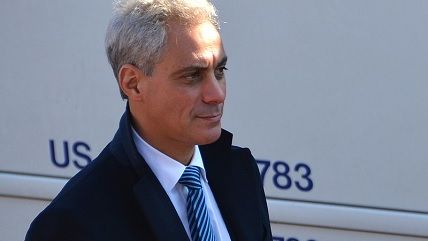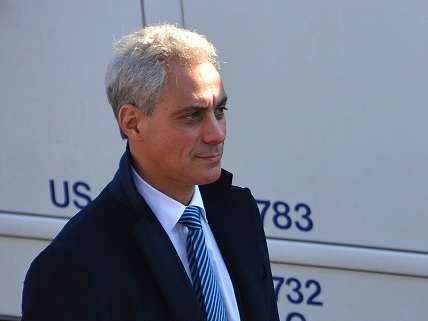The Twisted Politics of Police Violence in Chicago
Blame shifting and a lack of political accountability perpetuate problems with police, education, and even water.


Yesterday, Chicago Mayor Rahm Emanuel spoke at the conference of mayors in Washington, D.C., on a panel on policing and violence. But although the panel was hosted by Baltimore Mayor Stephanie Rawlings-Blake (D), who saw protests and riots over the death of Freddie Gray in police custody, the panel was not about police violence.
In fact, Emanuel, who recorded an 18 percent approval rating in December largely because of protests over the 2014 police shooting of 19-year-old Laquan McDonald, video of which was released late last year, did not mention the controversy at all, nor did he mention the Department of Justice (DOJ) civil rights investigation into the city's police department. Instead, as the Chicago Tribune reports, Emanuel stuck to City Hall talking points about combatting street violence. At one point, while noting "record" graduation records in Chicago, he said getting students through high school had "the biggest impact" on street violence.
Emanuel was re-elected less than a year ago with an 11 point margin over his challenger, Chuy Garcia, who was backed by the teachers unions. His victory was due in part to Emanuel's efforts at education reform as well as other modest reform efforts. Police reform was not part of that effort and, importantly, neither Garcia nor any other significant candidate for any other city office made police reform a campaign issue.
After activists pushed the issue of police violence into the political discussion in Chicago, teachers unions saw an opening to find new supporters for its own opposition to Emanuel, which never had anything to do with police reform. On Monday, the teachers unions, held an "alternative, people centered celebration" of Dr. Martin Luther King, Jr. that ran counter to the city's own annual, often apolitical, MLK breakfast. The city event was met by activists protesting police violence.
But while the teachers union may have its own agenda against Emanuel, police reform doesn't fit into it. As activists from Black Lives Matter have noted, police unions are a part of the problem of police violence. Activists associated with Black Lives Matter were so concerned about police unions that one of their first online policy efforts after unveiling "Campaign Zero" was a database to track police contract provisions that contribute to the problem of police violence.
The theory is the same for teachers unions—that, like with police unions, they by design produce rules that protect bad actors. Charter schools and other education reform efforts around the country have emerged largely to bypass those kind of contract provisions that keep bad teachers on the job and thus offer poorer children the quality education most state constitutions guarantee. Such a guarantee in California has led to a lawsuit that argues provisions negotiated by teachers unions have had the effect of denying children a quality education. It is a similar argument to the ones on police unions—that provisions negotiated by police unions have the effect of denying citizens their civil rights. Just as a union contract prevents a Board of Education from firing a bad teacher, so do union contracts prevent police departments from firing bad cops across the country.
So the Chicago teachers union's attempt to glom on to the police reform movement is disingenuous at best. But so is placing all the blame on Rahm Emanuel, who has only been mayor since 2011, when the police department and the policies they operate under have been formulated and maintained by democratic institutions at the local and state level. Emanuel's resignation would work better if it were joined by resignations by the rest of Chicago's political class, who bear as much, if not more, responsibility for the policies they have supported that have led to the lack of accountability for police violence Chicago has long suffered for. Something similar is happening in Flint, where some critics are choosing to lay the blame solely on the dirty water crisis on Governor Rick Snyder (R-Mich.), because he appointed an emergency manager who approved the decision to switch water supplies, when the democratically-elected city council voted 7-1 in favor of that decision first*.
Such blame shifting, whether it's about police violence, quality of education, or dirty water, erodes democratic institutions by inoculating them from accountability. Residents of Chicago who choose to blame Emanuel alone, just as residents of Flint who choose to blame Snyder alone, will keep voting for the politicians who predated Emanuel and Snyder and supported the policies that have contributed to today's problems.
*Clarification: there's also plenty of blame for the state foul-ups, and cover-ups, after the decision.


Show Comments (31)